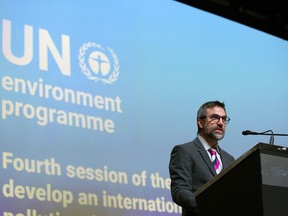Opinion: The Canadian government should lead the way in the Global Plastics Treaty negotiations in Ottawa and ban harmful plastics.

Article content
As a practicing family doctor and member of the Canadian Association of Environmental Physicians, I am especially concerned about the serious risks that plastics pose to human health, in addition to the damage that plastic causes to all ecosystems around the world.
That’s why I’m following closely as Canada hosts the fourth UN negotiating session for a Global Plastics Treaty in Ottawa on April 23-29. The goal of these meetings is to develop a legally binding international treaty that describes how to address the immense problem of plastic pollution. As the fourth meeting is being held in our own backyard, I am especially hopeful and hopeful that The Canadian government will lead the way and propose the strongest commitments to address our plastic problems.
Advertisement 2
Article content
Article content
Plastics are everywhere and their integration into our daily lives has been growing exponentially since the 1950s. Almost everything we use has some plastic component, such as food packaging, toiletries, clothing, furniture, kitchen utensils , cutting boards and much more. At the moment 460 million tons of new plastic They are manufactured every year and production is increasing. Global plastic production doubled between 2000 and 2019, and if no action is taken, plastic production rates could double again by 2040.
Globally, only nine percent of plastic is recycled and 50 percent ends up in landfills. The rest is incinerated, ending up as garbage or in our oceans. The main problem with plastic is that it does not degrade. Whether on land or in the oceans, larger pieces of plastic break down into smaller pieces, commonly called microplastics, over time. In fact, every piece of plastic ever created is still somewhere on our planet and never disappears.
Plastics have been found in the deepest ocean floors, in our deserts, soils and on the top of the world’s highest peaks. Studies also show that microplastics are found in the form of particles in the air.
Article content
Advertisement 3
Article content
The effects of plastic accumulation on all ecosystems are well known and visible. What we are learning more and more, due to increasing medical research, is the Negative effects of microplastics and chemicals plastic additives on the human body. Common plastic additives include phthalates, bisphenols and PFAs (polyfluorinated alkyl substances), as well as flame retardants, fillers, dyes and heavy metals.
In 2022, the researchers found traces of common synthetic polymers and microplastics in blood samples from human subjects. Plastics are absorbed into the bloodstream, through absorption in the digestive tract, when food contaminated with plastics is ingested. Studies have also shown the presence of microplastics in human lung tissue. They enter the respiratory system when breathing air contaminated with plastic particles. This can cause respiratory diseases such as asthma. From the lungs, microplastics can potentially migrate to other organs and tissues after being trapped by the immune system.
If microplastics can enter our bloodstream, they can potentially reach and even accumulate in any organ in the body. In fact, researchers have found microplastics in heart tissue samples of patients undergoing cardiac surgery. Nanoplastics have been found to breach the blood-brain barrier in mice and then trigger inflammatory cells. In humans, this can cause Neurodegenerative disorders such as Parkinson’s and Alzheimer’s diseases..
Advertisement 4
Article content
What has alarmed me the most is the discovery of microplastics in human placenta samples. Animal studies have shown that nanoplastics in the embryonic intestinal wall of chicks. This indicates that microplastics can pass from the maternal bloodstream to the embryo and affect very early stages of human development. My pregnant patients avoid alcohol, drugs, and certain prescription medications for fear of harming the developing fetus. They deserve more information and health warnings about the harm of microplastics or chemical additives to the developing fetus.
Equally concerning is the effect of plastics and additives on the endocrine system, which manages metabolism, reproduction, development and other essential functions. Microplastics and chemical additives are often called chemicals that disrupt the endocrine system because they alter or imitate the hormones within our body. Diseases related to endocrine disruptors include neurodevelopmental disorders such as autism spectrum disorder and attention deficit hyperactivity disorder. Other diseases related to these chemicals include obesity, type 2 diabetes, infertility, precocious puberty, miscarriages, male infertility, and many types of cancer.
Advertisement 5
Article content
The harm of plastics to human health is a human rights issue and environmental injustice. He adverse health effects The use of plastics affects those who live in communities near fossil fuel extraction sites or those who work in plastic production, due to air and water pollution. In addition to pollution, plastic beads production responsible for 3.4 percent of global greenhouse gas emissions. This doesn’t even take into account GHG emissions from incineration, landfilling and other plastic waste management practices. As we know, climate change disproportionately affects vulnerable communities, with health impacts resulting from disasters such as wildfires, floods and droughts.
The health harms, injustice and biodiversity loss related to plastic pollution are obvious. We can’t wait to act.
We call on the Canadian government to develop national strategies and lead the international community during Global Plastics Treaty meetings.
This includes limiting plastic production and expanding reusable alternatives. We need our government to ban dangerous chemical additives in plastics and take additional steps to ensure they don’t end up in food packaging, including those made from recycled plastic. Finally, the government must address the injustices suffered by communities and frontline workers and ensure everyone’s right to a clean, healthy and sustainable environment.
If our dependence on plastic is causing harm to the health of our children, then it is time for us to seriously reconsider the cost of plastic convenience.
Dr. Sharon Dodd is a family physician based in Richmond and is active on the Canadian Association of Physicians for the Environment BC regional committee.
Article content
